
Yongin is a city in the Seoul Capital Area, the largest in Gyeonggi Province, South Korea. With a population over 1 million, the city has developed rapidly since the 21st century, recording the highest population growth of any city in the country. Yongin is home to Everland and Caribbean Bay, South Korea's most popular amusement and water parks. The city is also home to the Korean Folk Village, the largest of its kind. Yongin-si is a multi-nuclear city with multiple urban centers, not a single nuclear structure, and Giheung-gu crosses the Yeongdong Expressway and Dongbaek, while Suji-gu crosses Pungdeokcheon Stream and Jukjeon.

Guri is a city in Gyeonggi Province, South Korea. It is located immediately to the east of Seoul, in the heart of the Capital Metropolitan Area.

Seoul Subway Line 4 of the Seoul Metropolitan Subway is a long line crossing from the southwest to the northeast across the Seoul National Capital Area. The central section in Seoul City is operated by Seoul Metro with some trains offering through service to Korail's Ansan and Gwacheon Lines. The southern terminus (Oido) is in Jeongwang 4-dong, Siheung City, and the northern terminus (Jinjeop) is in Jinjeop-eup, Namyangju-si, Gyeonggi-do; the newly built northern section is correspondingly owned by a company owned by Namyangju-si, with operations contracted to Seoul Metro. In 2022, the Seoul Metro operated section had an annual ridership of 219,587,000 or about 601,608 passengers per day.

Hyehwa Station (Korean: 혜화역) is a station on the Seoul Subway Line 4 in Jongno-gu, Seoul. It is located in the center of the area commonly known as Daehangno, and much of the ridership of this station comes from the nightlife scene. The Seoul National University Yongon campus, housing its Hospital and School of Medicine, is located to the southwest.

Namtaeryeong Station is a station on Seoul Subway Line 4. It is operated by Seoul Metro.

Apgujeong-dong is a ward of Gangnam-gu in Seoul, South Korea. It is considered one of the wealthiest neighborhoods in South Korea. It was reported that housing price of Apgujeong-dong is approximately US$28,300 per one square meter by Korea Ministry of Land, Infrastructure and Transport in 2019.

Nowon station is a station on the Seoul Subway Line 4 and Line 7. The station on Line 4 is elevated whereas the station on Line 7 is underground, owing to the elevated tracks of Line 4 between Danggogae station and Chang-dong station. In addition, the two stations are far apart, making passengers walk a considerable distance for transfers.

Seoul Grand Park Station is a station on Line 4 of the Seoul Subway network.

Seocho-dong is a dong, or neighborhood of the greater Gangnam area Seocho-gu district of the South Korean city of Seoul. Seocho-dong is divided into 4 different dong which are Seocho 1-dong, 2-dong, 3-dong and 4-dong. The main street is Teheranno. There is Gangnam Station in Seocho-dong, which is one of the biggest stations in Korea.
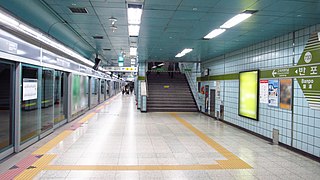
Banpo Station is a metro station on Seoul Subway Line 7 located in Jamwon-dong, Seocho-gu, Seoul. Despite its name, the station is not located in Banpo-dong, but instead in Jamwon. It has 6 entrances that they are all right side entrance and they have screen doors right before entering the train. It takes 4~8 minutes between 2 trains and next stations are Nonhyeon and Seoul Express Bus Terminal. It is only 500m long between Banpo station and two other Stations next to it. The station number is 733.

Jayang station is a metro station on Seoul Subway Line 7. It is located in Jayang-dong in the Gwangjin-gu administrative district of Seoul. It is the only station in South Korea to be located on the underside of a bridge, beneath Cheongdam Bridge. The station also runs underneath a highway with two exits being south of the highway and two north. The south exits serve Ttukseom Hangang Park, while the north exits serve Jayang 3-dong and Jayang 4-dong which contain some residential towers with small shops and other mixed commercial and residential areas. The station is serviced by a single bus route which is located at exit 4. Before Line 7 opened the station was known as Jayang Station (자양역).

Dongdaemun station is a station on Line 1 and Line 4 of the Seoul Metropolitan Subway. Sometimes called Dong Station, it is named after one of the Four Great Gates of the circular wall surrounding ancient Seoul, and is situated on the eastern end of Jongno. This station is also close to Dongdaemun Market.

Byeongjeom Station is a station on Line 1 of the Seoul Metropolitan Subway. It is the only train station serving the city of Hwaseong. It is the southern terminal station for approximately half of the subway trains on this line who then carry on to the nearby depot, one of the five depots on Line 1, with the remainder continuing to Cheonan or Sinchang Station.
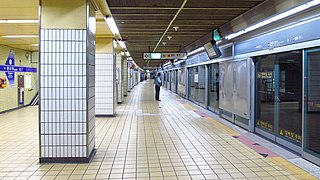
Gwangnaru Station is a station on the Seoul Subway Line 5 in Gwangjin-gu, Seoul. Its station subname is Presbyterian Univ. & Theological Seminary, where said university is nearby Exit 2.
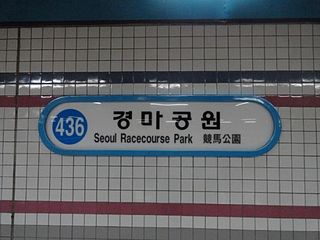
Seoul Racecourse Park Station is a station on Line 4 of the Seoul Subway. Its current name was given in 2000, before that it was called Gyeongmajang-yeok. True to its name, it is located near LetsRun Park Seoul, a horse racing venue. It attracts large volumes of people, particularly on weekends when thousands of Seoulites flock to the races to bet on their favorite horses. This is apparent in the significant difference between the weekday and weekend passenger usage of this station.
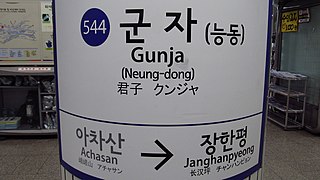
Gunja (Neung-dong) Station (Korean: 군자역) is a station on Line 5 and Line 7 of the Seoul Subway in Gwangjin-gu, Seoul.

Seoul Forest is a large park in Seongdong District, Seoul, South Korea. It is open year-round, and admission is free. Seoul Forest opened in June 2005. The city government spent 235.2 billion won in development. It is the third largest park in Seoul. Seoul Forest is a massive park dotted with over 420,000 trees and 100 different animals. This nature park is located in Seongsu-dong and covers an area of 1,200 ha.

Samseong-Dong is an affluent neighborhood or ward of Gangnam-gu in Seoul, South Korea.
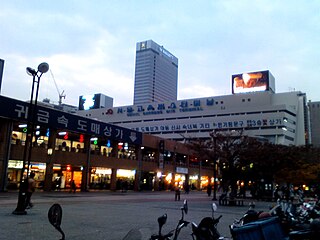
The Seoul Express Bus Terminal is the key bus terminal located in Seocho-gu, Seoul.

The City Air Logistics & Transportation (CALT), formerly known as 'Korea City Airport Terminal Co., Ltd.', is a 1985 established South Korean airport bus company headquartered in COEX, Gangnam District of Seoul.





















